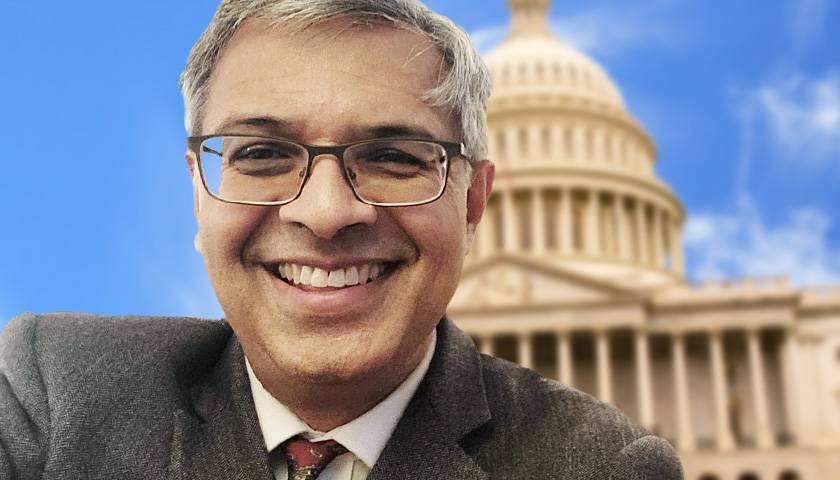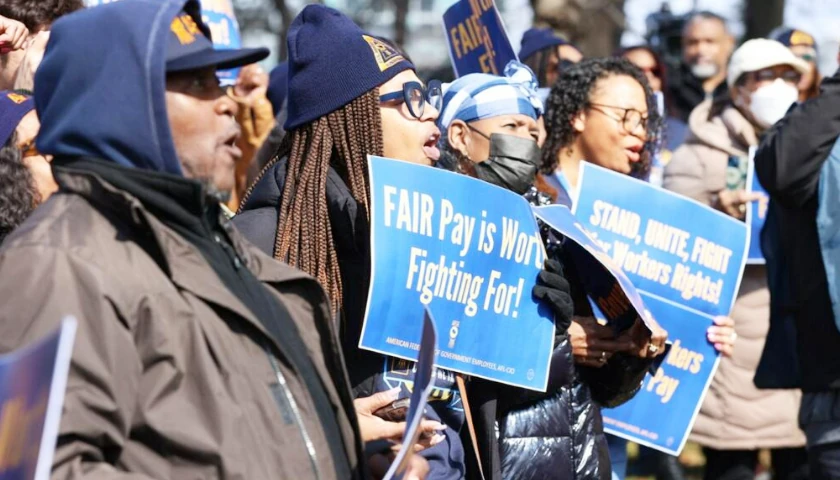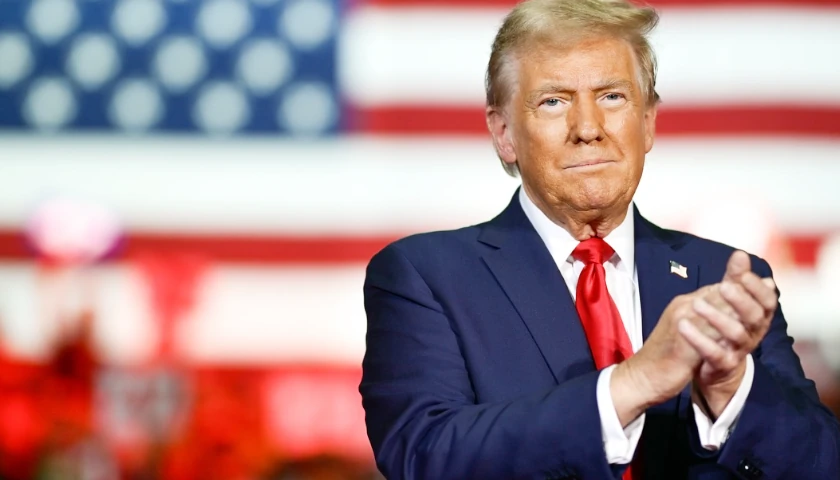by Conrad Black
These are only the opening days of what is supposedly the post-Trump era, and whether the country has really seen the last politically of Donald Trump is a matter that depends upon Donald Trump. The principal Trump-hate outlets are still pleased to refer to him as “the disgraced former president” but, of course, he has not been disgraced and there is no indication that he will be.
All of the Democrats and about a third of Republican officeholders are engaged in an elaborate and strictly observed pretense that Trump was a freakish and horrifying interruption of the normal, serene, bipartisan devolution of events in Washington. Like a dreadful meteor, he came and he went, pushed into the instantly forgotten past by a united effort of civilized Americans.
This is only the first and most wishful phase of the Biden Administration, which, although it has shown no open recognition of the fact, owes its existence to the support of a substantial number of traditional Republicans offended by the former president’s radical ideas and comparatively uncouth political manners. They more than balanced the sharp increases President Trump achieved for the Republicans in votes from African Americans and Latinos, along with traditionally Democratic working-class voters.
There appears to be a consensus to restore the traditional honeymoon for an incoming president, something that was withheld from Trump uniquely among presidents of the past century and is a useful and becoming practice to retrieve. President Biden, an admirer of Franklin D. Roosevelt, has invoked the “Hundred Days” of the profound legislative and executive reform with which FDR began his first administration in 1933 to address the most pressing aspects of the Great Depression, starting with the collapsed banking and stock and commodity exchange systems that greeted him on Inauguration Day. Roosevelt had a broad mandate to do whatever he judged necessary to arrest and reverse the economic and psychological depression that was strangling the country, and many of his imaginative measures were passed virtually without opposition and some with almost no debate.
Roosevelt concluded his famous inaugural address, which opened with the assertion that “the only thing we have to fear is fear itself,” with the following:
We do not distrust the future of essential democracy. The people of the United States have not failed. In their need they have registered a mandate that they want direct vigorous action. They have asked for discipline and direction under leadership. They have made me the present instrument of their wishes. In the spirit of the gift, I take it.
What followed was a thunderous sequence of measures of relief and reform that reversed the downward economic spiral, reinvigorated the country psychologically, and provided workfare employment and income for the 30 percent of the workforce sidelined at a time when no direct federal assistance existed for them. Conditions are not remotely similar now. Biden has no such mandate, and with all due respect, his political circumstances, personality, culture, and qualities of leadership, are not much reminiscent of FDR.
Biden’s 100 days show no sign of being particularly productive or even of being used by the new administration to present the kind of innovative legislation that poured out of the government in the early Roosevelt days. Biden’s $1.9 trillion COVID relief bill only addresses the public health crisis with approximately 10 percent of the funds sought. No other significant legislation has been presented in the first month of these 100 days and, of course, a good deal of time and attention was frivolously squandered in the fatuous impeachment of the departed former president.
While the new president has been commendably discrete in his comments about his predecessor, his partisans give little evidence of being psychologically capable of letting go of Trump-hate as a motive and preoccupation. Celebrations of his departure are not going to engage the public’s interest or satisfy its appetite for good government beyond what is left of these 100 days, if they even manage to do so until then.
It should be clear by the end of April if this president is prepared to be carried along by the far-Left elements of the fragile Democratic coalition, which the informal leader of the leftist Democrats, Senator Bernie Sanders (I-Vt.), reckons to be 35 or 40 percent of the party’s supporters. Or we’ll see if Biden can firm up the traditional moderately left-of-center section of the Democrats in which he served for six terms as a senator himself and two terms as vice president. This moderate element could collaborate with Republicans and legislate sensibly in the national interest. But they would do so at the likely expense of a schism among the Democrats, at least as severe and much more closely dividing that party than the present unequal contest between the anti-Trump Republicans and the majority within the GOP who support the former president.
This is the fundamental problem with the theory that Trump was just a regrettable passing accident. He espouses a set of policy options that commands the adherence of approximately half the voting population. In four embattled years as president, he achieved more than any previous occupant of that office since Ronald Reagan’s comparatively tranquil two terms, and, apart from Reagan, since the highly successful first term of Richard Nixon 50 years ago.
He will not be so easily dismissed and the honeymoon level of approval accorded Joe Biden—50-odd percent, depending on the poll—will be a levitation if he doesn’t start to build a track record of genuine accomplishment. Re-entering the Paris Climate Accord, being kind to Iran’s ayatollahs, and handing a blank check to the ecological zealots while relaxing security at the southern border is no substitute for governing and doesn’t make much sense as policy, either. Words and symbolic gestures come easily but the confirmation of senior administration appointments is moving slowly and was not accelerated by the disturbingly unconvincing performance of attorney general designate Merrick Garland in front of the Senate this week.
Biden will have to perform and the immediate former president has the opposite problem: silence becomes him and comparative quiet will be adequate to maintain his approval rating amongst those who have followed him. And while Trump haters will never be appeased even by the attrition of time, the 10 million or so quasi-Republicans who deserted him could be convinced by a more statesmanlike and judicious former president that they may have underestimated his virtues, especially if the Biden Administration does not gain any traction in a sensible direction.
President Trump’s scheduled address to CPAC on Sunday is assured of a wide audience: those who pretend he is a spent force will be listening to him, even if secretly, more carefully than will his scores of millions of outright supporters. He now occupies the historic role of a formidable exile: Napoleon at Elba (the original Hundred Days), Roosevelt convalescing from polio, Churchill in the wilderness years, de Gaulle at Colombey, Nixon while Vietnam boiled out of control. Trump is a hard sell as a successor fitting seamlessly into the role of any of those, but he enjoys an immense following, and those who united to depose him are going to have to do much better than they have in the last month to maintain their coalition and prevent his successful return, if he wants to make one, and stages it carefully.
– – –
Conrad Black has been one of Canada’s most prominent financiers for 40 years, and was one of the leading newspaper publishers in the world as owner of the British telegraph newspapers, the Fairfax newspapers in Australia, the Jerusalem Post, Chicago Sun-Times and scores of smaller newspapers in the U.S., and most of the daily newspapers in Canada. He is the author of authoritative biographies of Franklin D. Roosevelt and Richard Nixon, one-volume histories of the United States and Canada, and most recently of Donald J. Trump: A President Like No Other. He is a member of the British House of Lords as Lord Black of Crossharbour.
Photo “Trump Supporters” by Gage Skidmore. CC BY-SA 2.0.





I viewed to the CPAC speech and was very impressed by President Trump’s demeanor and call to action. I think he spoke just enough about the election fraud to let us know he has not forgotten , and should not forget the dirty deal he was dealt. Then he moved on to show us his willingness to lead conservatives back to winning the House and Senate and his priorities for reform of government while putting his faith in the American people. And he did it all in a very statesman-like manner. Good man, good speech, great leader.